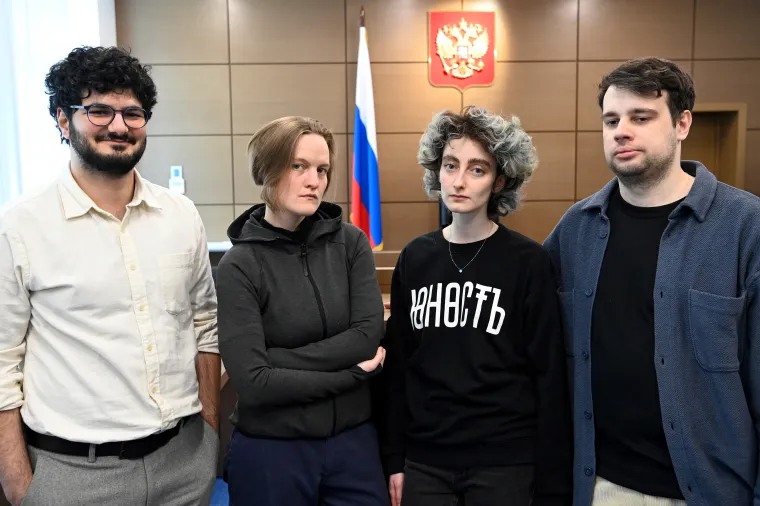Paris, April 6, 2022 — Russian authorities should immediately drop all charges against four former editors of the student-run magazine DOXA and stop listing journalists from independent media outlets as foreign agents, the Committee to Protect Journalists said Wednesday.
On April 1, at a hearing at Dorogomilovsky district court in the capital Moscow, the state prosecutor requested two years of correctional labor for the former DOXA editors for allegedly involving minors in rallies, according to news reports. The editors–Armen Aramyan, Vladimir Metelkin, Alla Gutnikova, and Natalia Tyshkevich–were charged in April 2021 under Article 151.2 of the criminal code in connection with a January 2021 video asking authorities to stop intimidating students during political protests, and were placed under home detention, according to CPJ research and news reports.
The verdict in the case is scheduled for April 12, according to DOXA.
After the April 1 hearing, police arrested Tyshkevich, and a court the next day sentenced her to 15 days in prison for allegedly displaying prohibited symbols in 2017, according to DOXA.
Separately on April 1, the Russian Ministry of Justice recognized five more Russian journalists as so-called media foreign agents, according to media reports. On April 5, journalists Yevgeny Kiselyov and Matvei Ganapolsky were the first to be included on the Ministry of Justice’s list of “individuals labeled as foreign agents” for allegedly engaging in political activities funded by Ukraine, according to news reports.
“Russia continuously resorts to using the arbitrary foreign agent law or fabricated cases to silence dissenting voices in the country,” said Gulnoza Said, CPJ’s Europe and Central Asia program coordinator, from New York. “Russian authorities must stop their persecution of the student media outlet DOXA and immediately repeal the arbitrary law on foreign agents.”
Tyshkevich was detained after the April 1 DOXA hearing and held overnight at Tverskaya police station in Moscow, according to the outlet. Her last words at the hearing included the word “war” to refer to the military clashes in Ukraine, instead of “special operation,” the government-approved term for the conflict, according to reports.
On April 2, Tyshkevich was sentenced to 15 days of administrative arrest under part 1 of Article 20.3 of the administrative code for “displaying prohibited symbols” in a 2017 social media post containing a Ukrainian trident, which police called a symbol of the Ukrainian Insurgent Army, according to the outlet and media reports. According to Tyshkevich’s lawyer, who was quoted in the DOXA report, the statute of limitations on this case expired in 2018.
On March 27, Russian state media regulator Roskomnadzor blocked DOXA’s page on the Russian social network VKontakte, according to reports.
The five journalists designated as “media-foreign agents” are former Dozhd TV (also known as TV Rain) journalist Maria Borzunova, Mediazona journalist Alla Konstantinova, The Bell founder Elizaveta Osetinskaya, The Bell editor-in-chief Irina Malkova, and Murad Muradov, a journalist for Kavkazsky Uzel (Caucasian Knot) in Dagestan.
Individuals on the list must regularly submit detailed reports of their activities and expenses, and the status must be listed whenever they produce content or are mentioned in news articles, according to the law. Non-compliance could lead to a two-year prison sentence.
Kiselyov and Ganapolsky, who were the first to be added to the list of “individuals labeled as foreign agents,” are two well-known journalists who left Russia in 2008 and 2014, respectively, and now work as journalists in Ukraine, according to a Reuters report.
The ministry created the registry at the end of 2020, but it remained empty until now, according to reports. The list registers individuals who receive money from abroad, engage in “political activities,” or “collect information in the field of military and technical activities of Russia,” according to the same reports, and requires they indicate their status when contacting state agencies, according to the Media Rights Center, a Russian non-governmental organization. Non-compliance can lead to a five-year prison sentence.
CPJ emailed Roskomnadzor’s press service and the Russian Ministry of Justice but did not receive any replies.
